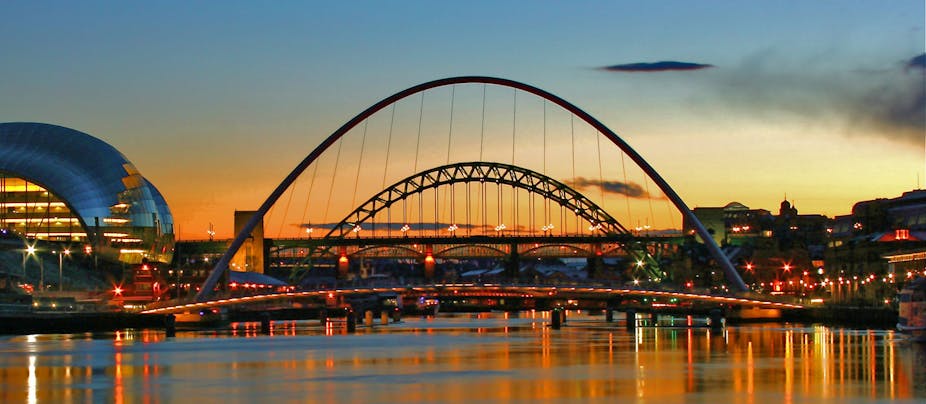The German anti-Islam group, Pegida, is scheduled to march in Newcastle on February 28 in what will be its British debut. Since its first march in Dresden in October, this grassroots protest movement has caused widespread concern.
This concern is growing despite claims that the group lacks a clear message, is struggling to maintain support, and has lost momentum after two of its leaders stepped down in the same week, the first after posing as Hitler and the second citing media pressure.
Location, location, location
Dresden and Newcastle may not initially seem like obvious places for anti-immigration and anti-Islam marches. Neither city is home to a large Muslim population, especially when compared to other German and British cities such as Berlin, Dusseldorf, Birmingham and Bradford.
Some attempt has been made to explain why Pegida grew out of Dresden, such as by looking at the city’s history of conservatism and provincialism. But it is harder to explain why Newcastle has been chosen for its first British march.
The organisers of the march initially said they chose Newcastle because there is little other far-right activity in the city, making it a more neutral place to march.
But Newcastle has arguably experienced a rise in conflict between Muslims and non-Muslims of late. There has been an increase in racial hate crimes and Islamic State-related graffiti has appeared in some areas. Anti-Muslim stickers have also been spotted in pub and supermarket toilets on Tyneside and Wearside ahead of Saturday’s march. It is potentially this recent tension that has attracted Pegida.
History of acceptance
These recent instances of friction and hostility are mostly a recent problem. There is a long history of Muslim settlement and often positive race relations in the region. The coastal Tyneside town of South Shields was home to what was one of the first settled Muslim communities in Britain. This consisted of Arab seafarers who arrived at the turn of the 20th century. And during a visit to the area in 1977, Muhammad Ali had his marriage blessed in the South Shields mosque – a moment celebrated in the history of the area.
Newcastle itself is often seen as a British city that is open and welcoming to minority groups. Irish and black migrants were well treated in the 1800s and Newcastle University awarded Martin Luther King J. an honorary doctorate in 1967 – the only university in the UK to do so while he was alive.
The North East should by no means be considered a racial utopia, having experienced race riots and its fair share of racial tensions and discrimination, but there has long been a sense of pride in the tolerant and accepting nature of the local people.

Britain and Germany also each has its own particular immigration history. Due to the legacy of the British Empire, the Commonwealth immigrants who arrived to Britain during the post-1945 period had some pre-existing link with the “mother country”. In contrast, Germany’s economic miracle of the 1950s led to the creation of the guest-worker programme through which foreign workers arrived on what was expected to be a temporary basis.
While Britain was arguably more accepting of its position as a multi-racial country, Germany remained adamant that it was “kein Einwanderungsland” – not a country of immigration. This attitude held, even once some of its guests had decided to stay. It is the pioneers and descendants of these immigration waves, as well as more recent refugees and asylum seekers, who are feeling the full brunt of the Pegida movement.
Bigger picture
In truth, individual local and national histories seem almost irrelevant in this particular debate. Muslims in both the UK and Germany, and indeed across the Western world, are being pushed into centre stage in debates about multiculturalism, national identity, cultural tensions, the preservation of Western values, and extremism. It is from these fears and anxieties that Pegida has grown.
We can no longer tell ourselves that this movement is a “German problem”. There is no doubt that Pegida’s event in Newcastle will put race relations to the test. It may even result in an increase in Islamophobic sentiment and attacks, and reinforce the unfortunate and all too prevalent perception that Muslims are a “problem” for the integration agenda.
We can, however, take some small comfort from the vast amount of support pledged to Newcastle Unites Against Pegida ahead of its counter demonstration, and we can hope that the city’s local welcoming spirit prevails.

